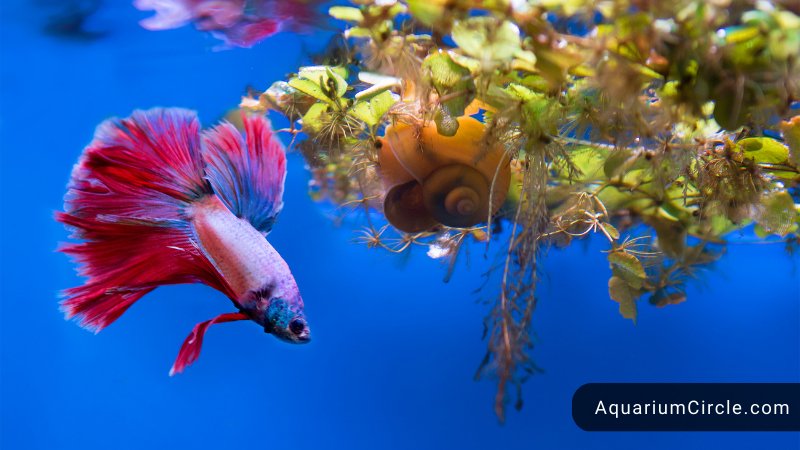Betta fish, with their bright and vivid colors, are a popular choice for aquarium enthusiasts all over the world. But despite their beauty, there are still many questions about their behavior and needs that remain unanswered. One common question is “do betta fish sleep?.” This seemingly simple question can actually reveal a lot about the nature of these fascinating creatures, and the way they live their lives.
Understanding their sleep habits is important for providing the best care possible, as well as ensuring that they remain healthy and happy in their environment. In this blog post, we will explore the sleeping habits of betta fish, the factors that can affect their sleep patterns, and how to create an optimal sleep environment for your betta fish. Whether you are a betta owner or you’re new to betta fish, this post will provide you with valuable insights into the sleeping habits of betta fish, and help you provide the best care possible for your underwater friends.
See also:
- Is Your Betta Fish Sleeping Or Dead? Advice Of An Aquarium Enthusiast
- Betta Fish Laying On Side: Top 13 Vital Reasons You Should Beware
- Betta Fish Vertical Death Hang: 5 Reasons & 3 Best Solutions
Do Betta Fish Sleep? Here Is The Exact Answer!
The question of whether betta fish sleep or not is one that arises frequently among fish enthusiasts. While it may seem like a simple question, the answer is actually more complex than one might think. Sleep is defined as a state of rest characterized by reduced consciousness, slowed metabolism, and inactivity.
While we know that many animals sleep, it’s not always clear what sleep looks like in different species, and whether fish are capable of experiencing this state. Therefore, the question of whether betta fish sleep is really asking whether these fish are capable of entering a state of rest characterized by reduced consciousness and inactivity, and if so, what this state looks like in the context of their unique physiology and environment.
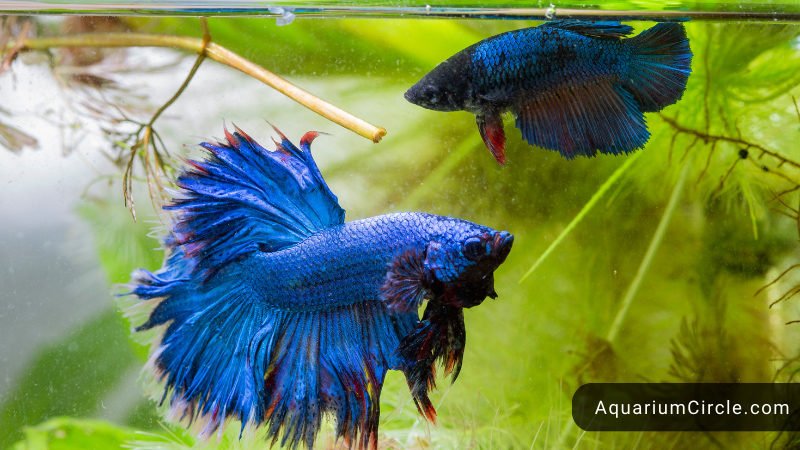
So is betta fish are capable of entering a state of rest?
Yes, betta fish are indeed capable of entering a state of rest, which can be considered a form of sleep. Like all animals, betta fish require periods of rest to allow their bodies to recover and repair. During this time, they may experience reduced consciousness and slowed metabolism, which are characteristics of sleep. While their sleep patterns may be different from those of humans or other mammals, research has shown that betta fish exhibit patterns of rest and activity that suggest they do enter a sleep-like state.
Therefore, it is important for betta fish owners to provide their fish with an environment that allows for proper rest and to be mindful of their sleep needs when caring for them.
Importance of understanding the sleeping habits of betta fish
Understanding the sleeping habits of betta fish is important for several reasons. First and foremost, providing an environment that allows for proper rest is essential for the health and well-being of betta fish. Just like humans, animals require periods of rest to recover and repair their bodies, and inadequate sleep can lead to a variety of health problems.
Additionally, understanding how betta is sleeping can help owners recognize signs of stress or illness. For example, if a betta fish is sleeping more or less than usual, this may be a sign that something is wrong with their environment or health.
Lastly, understanding betta fish sleep patterns can also help owners create a more engaging and stimulating environment for their fish. Providing an environment that allows for rest as well as activity can help promote natural behavior and improve overall quality of life. In summary, understanding the sleeping habits of betta fish is crucial for ensuring their health, detecting potential health problems, and creating a stimulating environment that promotes natural behavior.
How Can You Tell If Your Betta Fish Is Sleeping?
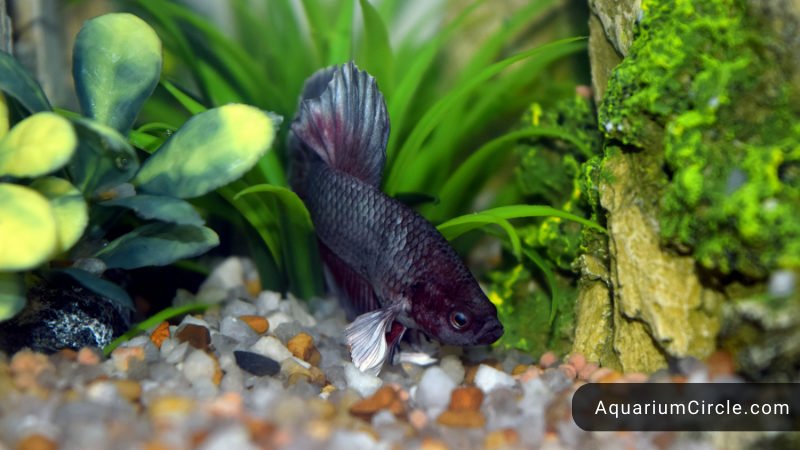
Betta fish do not have eyelids, so it can be challenging to determine sleeping betta fish just by looking at their eyes because they don’t close their eyes when sleeping.
To determine a sleeping betta, there are a few key things to look for. Firstly, like humans, bettas still need to breathe during their sleep. Therefore, observing your betta’s mouth and gills can be a good indicator of whether or not it is sleeping. During sleep, bettas tend to breathe more slowly, and the movement of their mouth and gills will be slower than when they are awake.
Another way to tell if your betta is sleeping is to observe any changes in its color. While sleeping, you maybe see your betta become paler or lose their bright color, which is a natural self-defense mechanism to avoid being spotted by predators. However, the color change should be temporary and your betta’s color should return to normal when it wakes up. If the color change persists, it may indicate an underlying health issue.
The position of your betta can also be a clue to whether or not it is sleeping. Betta may sleep curled up like a cat, lying on one side with its head pointed down towards the substrate, or even vertically with its head pointing towards the bottom of the tank. Some bettas even sleep with their fins open, which can be a fascinating sight for aquarium enthusiasts.
If you are unsure whether or not your betta is sleeping, it is important to avoid startling it awake. This means refraining from turning on the light at night, tapping on the glass, or poking your betta. These actions can shock your betta and cause unnecessary stress.
Finally, if you are still unsure whether or not your betta is sleeping, wait until its usual feeding time. Bettas typically do not sleep through feeding time, so if your betta is hungry and actively seeking food, it is likely awake and alert.
Where Do Bettas Sleep? Do These Fish Need Darkness To Sleep Well?
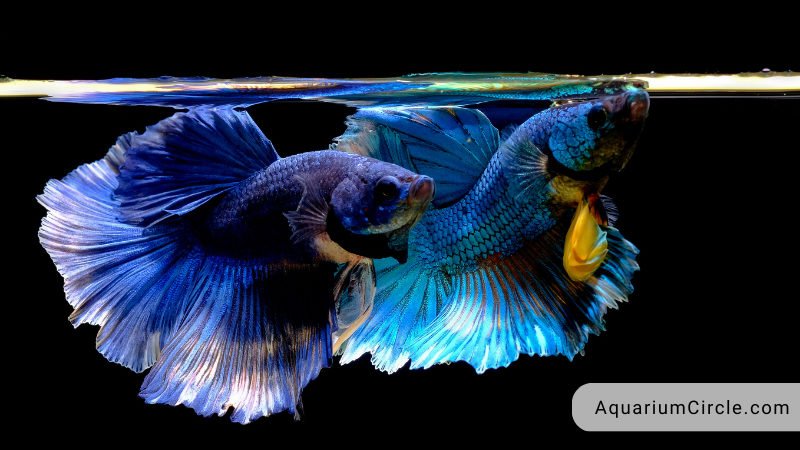
Betta fish can sleep in a variety of places in their aquarium, depending on their preferences and the layout of the tank. Some bettas like to sleep near the bottom of the tank, often resting on aquarium plant leaves or decorations. Others may prefer to sleep in mid-water, while some bettas may sleep near the surface of the water.
It is not uncommon for bettas to choose a specific spot in their tank to sleep in, such as a particular plant or decoration. Bettas may also sleep in different positions, such as sleeping on their side, sleeping vertically, or even resting on the bottom of the tank with their head propped up against something.
Providing hiding places and resting areas in the aquarium, such as plants and decorations, can help encourage bettas to rest and sleep comfortably. It is also important to ensure that the tank is dark enough as betta fish are very active during the day so they typically need darkness to sleep well. Like many other animals, bettas have a natural circadian rhythm that is influenced by light and dark cycles. In their natural habitat, bettas are used to a day-night cycle, and they have adapted to rest and sleep during the dark hours.
In an aquarium, it is important to provide a dark environment for bettas to sleep at night. This means that the aquarium should have a natural day-night cycle with a period of darkness at night. Betta fish can become stressed or agitated if they are exposed to constant light or are kept in a bright environment during their sleep cycle.
Factors That Can Affect Betta Sleep And How To Deal With Them

There are several factors that can affect the sleep of betta fish, including:
- Water quality: Poor water quality can cause stress and discomfort for betta fish, making it difficult for them to sleep.
- Betta tank size: If the tank is too small or overcrowded by other tank mates, bettas may not have enough space to rest and sleep comfortably.
- Water temperature: Bettas are tropical fish and require warm water to thrive. If the water temperature is too cold or too hot, it can disrupt their sleep patterns.
- Lighting: As mentioned earlier, bettas need a period of darkness to sleep well. If the tank is exposed to constant or bright light, it can interfere with their sleep.
- Noise: Loud noises or sudden vibrations can startle and stress betta fish, making it difficult for them to sleep.
- Diet: Overfeeding or feeding inappropriate foods can cause digestive issues and discomfort for bettas, affecting their ability to rest and sleep.
It is important for betta owners to take these factors into consideration and provide a comfortable and stress-free environment for their fish to sleep well. Regular water changes, proper tank size and temperature, appropriate lighting, and a balanced diet can help promote healthy sleep patterns for betta fish. Keep reading to get more details of how to give your betta fish a comfortable environment for their sleep.
Importance Of Betta Fish Sleep Well To Their Overall Health
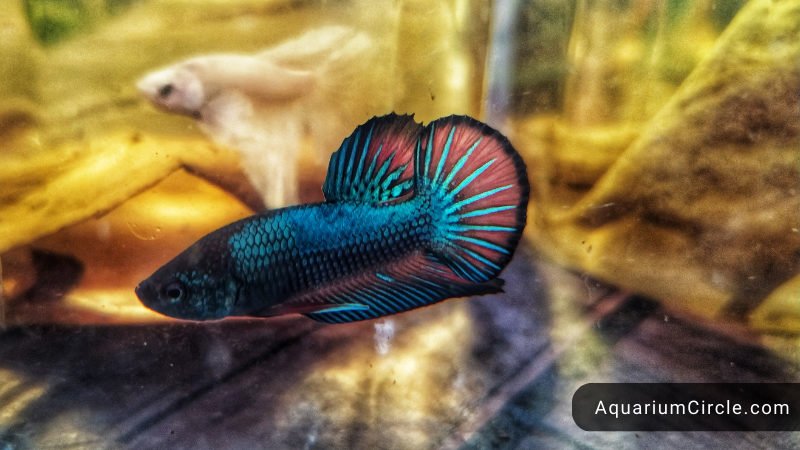
Sleep is an essential aspect of the overall health and wellbeing of all living organisms, including betta fish. During sleep, the body undergoes crucial restorative processes, such as repairing damaged tissues, consolidating memories, and regulating hormones and metabolic functions. It is particularly important for betta fish as it helps to reduce stress and promote a healthy immune system, and a lack of sleep can weaken their immune system, making them more vulnerable to diseases, infections, and other health issues.
In addition to physical health, sleep also plays a critical role in mental health and cognitive function. Betta fish that do not get enough rest may exhibit behavioral issues, such as aggression or anxiety, and may have difficulty learning and adapting to their environment. This can lead to decreased appetite, lethargy, and a weakened ability to swim, which can negatively impact their ability to interact with other fish, explore their environment, and engage in their natural behaviors.
Last but not least, just like in humans, sleep deprivation in betta fish can also result in a decrease in brain function and cognitive ability. During sleep, the brain forms new connections and consolidates memories, which are critical for learning and adaptation. Lack of sleep can disrupt these processes, making it difficult for betta fish to learn new things, solve problems, and adapt to changes in their environment.
See also: Betta Fish Fins Look Ripped: Top Reasons & Magic Tips To Treat
How To Ensure Your Betta Fish Get Proper Sleep?
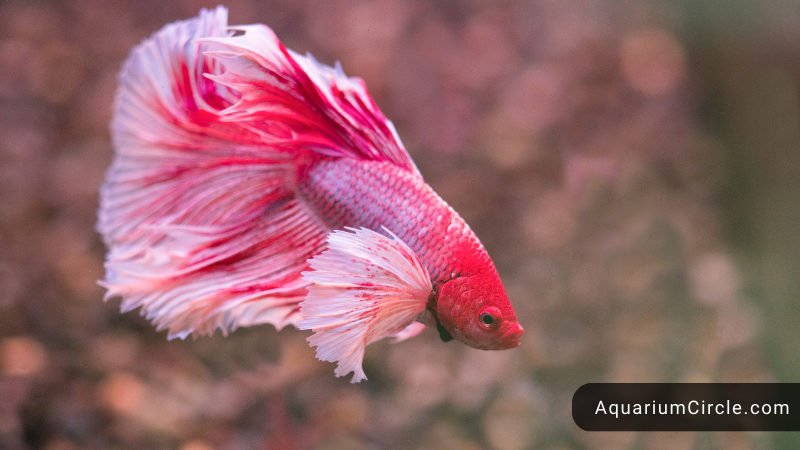
Ensuring that betta fish get proper sleep is crucial for their overall health and wellbeing. Here are some tips to help you create a comfortable and suitable sleeping environment for your betta:
- Provide a suitable habitat: Make sure your betta has a comfortable and suitable habitat with plenty of hiding places and plants. Bettas prefer dimly lit environments, so consider using a low-wattage bulb or a dimming light to help create a more natural sleeping environment.
- Keep the water quality in check: Poor water quality can cause stress and other health issues for your betta, which can interfere with their sleep. Ensure that you maintain good water quality by performing regular water changes and using a good quality filter.
- Avoid sudden changes: Bettas are sensitive to sudden changes in their environment, which can cause stress and disrupt their sleep. Make sure to avoid sudden changes in the temperature, lighting, or water conditions in the tank.
- Keep a consistent routine: Bettas thrive on routine and predictability, so it’s important to keep a consistent schedule for feeding and maintaining the tank. This can help your betta establish a regular sleep pattern.
- Avoid disturbing their sleep: Bettas can easily be startled, so it’s important to avoid disturbing their sleep. Avoid tapping on the glass or making loud noises near the tank during their sleep period. Consider covering the tank with a dark cloth or turning off the lights at night to help them sleep undisturbed.
In conclusion, betta fish do sleep, but in a different way than humans and other animals. Understanding their sleeping habits is important for their overall health and wellbeing. Providing them with a comfortable and suitable sleeping environment, maintaining a consistent light and dark cycle, and minimizing disturbances during their resting period can help ensure they get proper rest.
Adequate sleep can promote a healthy immune system, mental health, and cognitive function, and can help prevent behavioral issues and other health problems. As responsible betta fish owners, it is our duty to provide them with the best care possible, including ensuring they get the proper amount of sleep they need to thrive.
Video About Betta Fish Sleeping
FAQs
How do I know if my betta fish is sleeping?
Betta fish tend to sleep at the bottom of the tank or near the surface. They may also appear motionless or have a slower breathing rate.
Do betta fish sleep with their eyes open or closed?
Betta fish sleep with their eyes open. Some may even sleep while moving around, but they tend to be less active during their sleep period.
Can betta fish sleep in complete darkness?
Yes, betta fish can sleep in complete darkness. In fact, they may sleep better in a completely dark environment.
References

Annette M. Chaney is an experienced marine biologist with over 20 years of experience as an aquarist and fishkeeper. She started her first aquarium at a young age, filling it with frogs and goldfish obtained from the ten-cent pet store.
Annette grew up caring for and breeding African Cichlids, which led to a hobby in high school that doubled as a profitable means. Attending Reed College gave her time to solidify herself as an accomplished aquarium caretaker with an eye for sales. After that, from 2009 – 2013, she studied at Roger Williams University – one of the most prestigious universities for Aquaculture and Aquarium in USA. She is the founder of AquariumCircle since 2010.
